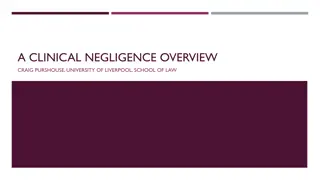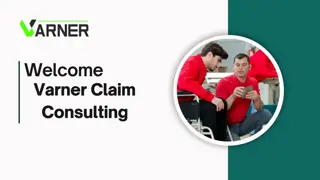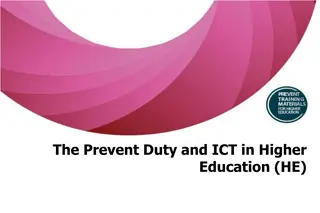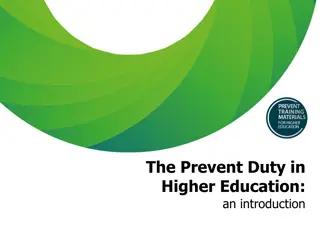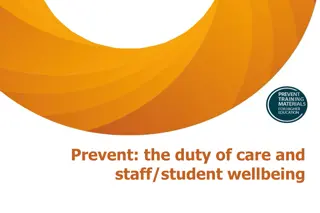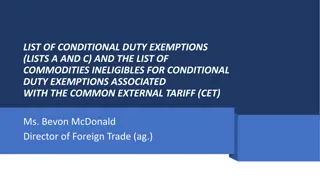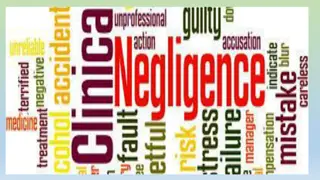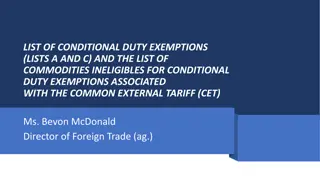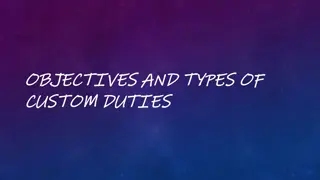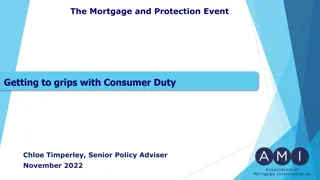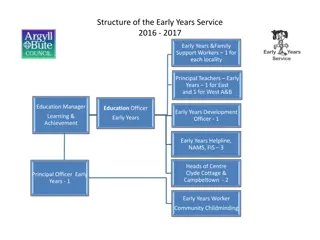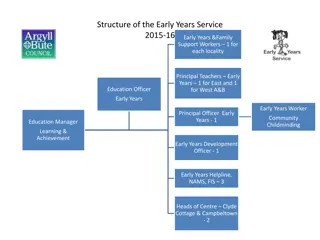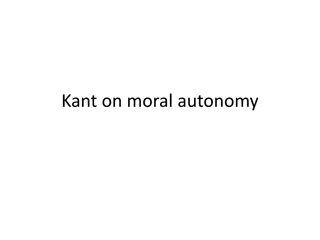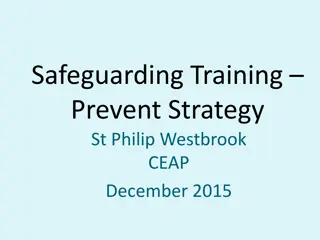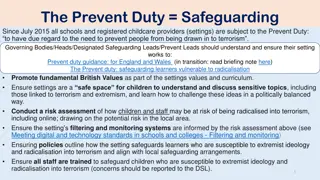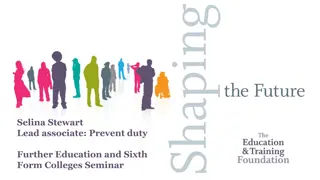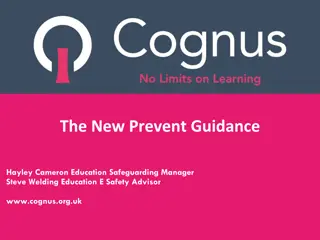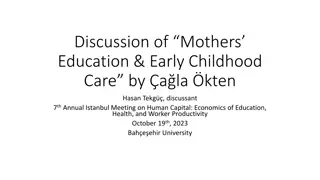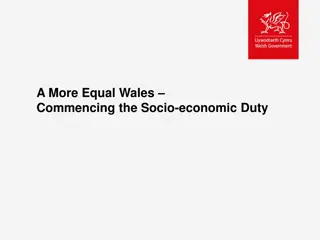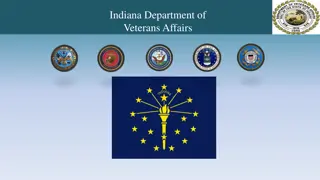Prevent Duty Training for Early Years Education Professionals
The Prevent Duty Training for Early Years Education Professionals aims to provide crucial information on the Prevent Duty and responsibilities outlined in KCSIE 2023. The training covers key aspects such as local risk factors, extremist groups affecting youth, recognizing signs of vulnerability in children, and guidance on responding to concerns. Compliance with the Prevent Duty ensures safeguarding practices are aligned to address radicalization risks effectively.
Download Presentation

Please find below an Image/Link to download the presentation.
The content on the website is provided AS IS for your information and personal use only. It may not be sold, licensed, or shared on other websites without obtaining consent from the author. Download presentation by click this link. If you encounter any issues during the download, it is possible that the publisher has removed the file from their server.
E N D
Presentation Transcript
Prevent Awareness Training Early Years Education Louise Cox -Prevent Education Officer Nottingham City Council NO RECORDING PLEASE This slide forms part of a comprehensive training package that deals with sensitive and controversial topics. It should not be reproduced individually, out of context or without experienced facilitators. Any attempt to do so would misrepresent the content of the workshop.
Aim of the session today To provide DSL s information with regards to the Prevent Duty and their responsibilities as outlined in KCSIE 2023 To provide an update on the local risk picture as per the 2024 CTLP To provide an update on any other extremist groups or activity that may impact young people
What we will cover Refresh our knowledge about what prevent is, what it aims to achieve and why the need for it The Prevent Duty and Early Years Local context/Key messages Vulnerabilities/Signs a child is at risk Channel NOTICE, CHECK and SHARE What do if concerned NOTE some content may seem school relevant
THE PREVENT DUTY GUIDANCE Implementing the Prevent Duty within an Early Years Framework 203 -The Education Inspection Framework sets out how Ofsted inspects maintained schools, academies, non-association independent schools, further education and skills provision, and registered early years settings in England. Ofsted s current inspection framework for early years provision reflects the requirements in the early years foundation stage statutory framework. ISI s inspection framework sets out how it inspects independent schools in England, including residential (boarding) schools and registered early years settings. Children and young people continue to make up a significant proportion of Channel cases, and in recent years there have been concerns regarding increased numbers of learners being arrested for terrorism-related offences. Settings should not only be alert to violent extremism but also non-violent extremism, including certain divisive or intolerant narratives which can reasonably be linked to terrorism. Educate Against Hate and GOV.UK Prevent duty training provide further information on extremist narratives.37, 38
Prevent Duty Stakeholder Pack CLICK LINK HERE: Prevent Duty Guidance - Schools and early years providers final2 (educateagainsthate.com) Compliance with the Prevent duty reflects existing good practice on safeguarding. It will ensure susceptibility to radicalisation is incorporated into safeguarding training, policies and risk assessments.
Prevent Duty What does it look like in practice? Clear procedures in place for protecting children at risk of radicalisation: does not require a separate risk assessment but should be built into existing policies and procedures Do those risk assessments accurately reflect and account for the local risk and 2023 Contest priorities Working in partnershipwith Nottingham Safeguarding Children s Partnership , local authorities, the police and others in the community, including parents Appropriate staff training including general Prevent awareness, WRAP, and when and how to refer to Channel DSL must be trained in Prevent and able to advise staff IT- procedures for access to online material covered in policies, appropriate filters.
PREVENT OBJECTIVES Early intervention to tackle the causes of radicalisation and respond to the ideological challenge of terrorism. To safeguard and support those most at risk of radicalisation through early intervention, identifying them and offering support to divert them away. To enable those who have already engaged in terrorism to disengage and rehabilitate. Working online and offline to empower communities and individuals. There are falsehoods and misconceptions around PREVENT being spread by people with ill intentions it is important to reiterate that it is safeguarding.
PREVENT CONTEST is the name of the UKs Counter Terrorism Strategy and is the UK s response to terrorism. CONTEST Strategic Framework consists of four work strands which are known within the Counter Terrorism community as the four P s : PREVENT PURSUE PROTECT PREPARE The aim of CONTEST is to reduce the risk of terrorism to the UK (and overseas) and its citizens so that people can go about and live their lives freely and with confidence. # Counter-Terrorism & Security Act 2015, Counter-Terrorism & Security Act 2015, Prevent Statutory Duty requires all education providers to help prevent the risk of people becoming terrorists or supporting terrorism .The guidance introduces a new theme - Reducing Permissive Environments to tackle the ideological causes of terrorism. For schools and early years, this includes the existing considerations of building resilience through the curriculum and having effective IT and visiting speaker policies to reduce exposure to radicalising influences. The Prevent duty: an introduction for those with safeguarding responsibilities - GOV.UK (www.gov.uk)
NATIONAL STATISTICS - Year ending March 2023 In the year ending 31 March 2023, individuals aged 15 to 20 accounted for the largest proportion of the 6,796 referrals to Prevent (2,203; 32%) Under 14 accounted for the second largest proportion of referrals (2,119; 31%) 88% Male
The Counter Terrorism Local Priorities for 2023 in Nottinghamshire are: AQ/ISIS Inspired Terrorism Extreme Right Wing Terrorism Online Extremism Self-Initiated Terrorists (S-ITs) Prevent referrals have increased by 27% on the previous year. The age group with the highest rates of referrals are individuals aged 12-16 (37% of total referrals) The highest proportion of referrals originate from the Education/Police Sectors 45% online predominant methodology of those INVESTIGATED- Children can be exposed to extremist material associated with terrorist groups & can share with peers
The online space Extremists and radicalisers use ALL forms of social media, and they cater for everyone. They use popular topics to attract YP to their content which often links to extremist content We teach children and young people about online safety, but do WE know enough ourselves? What socials are they using? How familiar are we with their workings? Parent engagement? Instagram is the most popular news source among young people and is now used as the main news source by 29 percent of teens, with TikTok and YouTube close behind on 28 percent Two things that platforms such as GAB and 8Kun have in common Anonymity and zero accountability! Essentially NO censorship Also presence of Incel movement Use of these platforms is not illegal but should be considered in context when there is a concern Gaming spaces can be problematic- first person shooter games immersive and realistic. A good spaces for individuals to find common ground with YP. Convenient for creating and sharing propaganda (flames of war video)
Vulnerabilities/Susceptibility not exhaustive list (Referrals context is key) Struggling with a sense of identity and belonging Becoming distanced from their cultural or religious background Questioning their place in society Family issues/Family Breakdown/Bereavement Adverse Childhood Experiences-Experiencing a traumatic event Difficulty in interacting socially and lack of empathy Difficulty in understanding the consequences of their actions Mental Health/Special Educational Needs/Learning difficulties Low self esteem Period of transition/confusion Misinterpretation of religion Isolation Anger sense of injustice Anger at government policies- Both Nationally and Internationally
Push and Pull factors What causes an individual to be radicalised Push factors are the vulnerabilities that push someone away from mainstream society, protective factors, things they enjoyed doing or people they enjoyed spending time with etc Pull factors are the things that make engaging with an extremist group or individual appealing or worthwhile for the vulnerable person Groups and individuals will usually offer someone an answer to their problems or a solution to the things making them vulnerable-pulling them towards an extreme narrative or ideology
What signs might we see to indicate a younger child is being influenced? Behaviour Has the child s behaviour deteriorated with no apparent explanation? May not always be radicalisation/extremist influences, perhaps is another safeguarding issue Role Play Have you noticed the child acting out violent/inappropriate behaviour at playtimes? Vocabulary Different/inappropriate language used towards other children or staff. Talking positively about dangerous groups or people who promote hate, or make it seem like these groups are OK Tolerance Has the child expressed intolerant views or behaviour towards other children? Refusing to talk to people from a certain country or who have a different sexuality or belief Being rude, aggressive or violent towards a particular group of people, for example, Jewish, Muslim or gay people Pieces of Writing or drawings that give you cause for concern
And remember, its not always just the children who are vulnerable . New to an area/Country Domestic violence Financial hardship Housing issues Language barriers Unemployment Alone without support
What should I do if I am concerned? NOTICE, CHECK, SHARE Share this information with your DSL or a manager Speak to the child you are worried about Speak to the Prevent team, if necessary Set up a time and space to talk Try to find a time when you can speak to the person in a private, safe place, free from interruptions. Ask open questions not leading How are you getting on at the setting? How are things at home? How are you finding your exercise group? Explain why you re asking. Follow it up! Trust your instinct Record Accurately NOTE: It is good practice to be open and transparent with parent/carers UNLESS it adds risk.
WHAT HAPPENS IF REFER? Referral is assessed for information gathering Channel support not needed: might be signposted to other forms of support Channel support needed: setting may be invited to attend Channel panel Agencies include: Probation/prisons Health YOS Mental Health Local authorities Social Services Parental consent needed if under 18 (BY CHANNEL) Channel support: Does NOT lead to a criminal record It is NOT disclosed on a DBS It s about getting the right help at the right time Monthly Channel meetings assess progress with interventions
Prevent Continuum Equalities legislation and mainstream Police activity Suitable for Channel Police-led space Criminality - Pursue Deeply radical beliefs in violence as a solution Encouraging or inspiring acts of terror Prejudice and intolerance Interest in violent extremism Engagement with violent ideologies Committing acts of terror Hate Crime There is not a conveyor belt towards terrorism, but Prevent should be used for those susceptible to a CT risk
Ofsted specify that 75. Early education funding regulations in England have been amended to ensure that providers who fail to promote the fundamental British values of democracy, the rule of law, individual liberty and mutual respect and tolerance for those with different faiths and beliefs do not receive funding from local authorities for the free early years entitlement. 76. Ofsted s current inspection framework for early years provision reflects the requirements in the Statutory Framework for the Early Years Foundation Stage.
Reducing Permissive Environments 175 - Settings should have measures in place to prevent their facilities being exploited by radicalisers. This includes seeking to ensure that any event spaces or IT equipment are not being used to facilitate the spread of extremist narratives which encourage people into participating in or supporting terrorism. Such measures will help to limit access to platforms that can be used to radicalise others.
What does building resilience look like in your setting? Consider what you do to promote children's resilience against unhealthy influences keep in mind FBVs How do you promote an understanding of difference? Are these values embedded in your setting? Think about the things you do to create a strong foundation these all go towards building resilience and making them well equipped human beings who are less likely to use violence towards those who are different or disagree with them! Think outside the box its not just the obvious stuff! How could you improve?
Democracy Children have the opportunity to have their voices heard through setting Council, circle times, class discussions and questionnaires. Pupils are encouraged to share their thoughts and opinions whilst understanding the importance of allowing others to have their say. Developing their ability to work and play co-operatively and fairly together Understanding and respecting the democratic process and the importance of taking part
Rule of Law Children are continuously taught the importance of making the right choices in relation to their behaviour both in and out of the classroom. Distinguishing right from wrong and encouraging them to take responsibility for their behaviour High expectations which are reinforced through class codes of conduct, Golden Rules, assemblies, PSHE and home-school agreements. Rewards and sanctions systems are clear and embedded across the setting. Children are taught right from wrong and the importance of honesty and taking responsibility for their actions. Visits from authorities such as the Fire Service help to reinforce the message that laws/rules are there to protect us and that there are consequences when laws are broken
Individual liberty Children are actively encouraged to make choices, knowing that they are in a safe and supportive environment. Throughout the curriculum and during structured PSHE sessions, opportunities given for all children to develop an understanding of their rights and freedom to make choices, whilst respecting the choices of others. Children being encouraged to think for themselves and take ownership of their learning. Enabling children to develop their self knowledge, self esteem and self confidence Distinguishing right from wrong and encouraging them to take responsibility for their behaviour
Mutual respect and tolerance for those with different faiths and beliefs Children are encouraged to recognise, accept and respect cultural diversity through assemblies, PSHE sessions and RE curriculum. Having an understanding and tolerance of different faiths and beliefs outside their own communities Different faiths and beliefs within the wider community celebrated through theme days and circle times, where children have the opportunity to develop their understanding of difference .
To consider What have you done in your setting to evidence to Ofsted the Prevent agenda and British Values has been embedded into practice?
Group exercise You notice a four-year-old boy playing with another boy and he enacts a scene where he makes the boy kneel down and slides his hand across the boy s throat. You have also noticed that the boy is becoming more violent and aggressive during play times with other children. He refuses to play with any child that does not share his cultural background. What behaviours concern you and what would you do?
CONTACT FOR SUPPORT IN CONFIDENCE: Louise Cox Prevent Education Officer, Nottingham City Council Louise.cox@nottinghamcity.gov.uk Police Prevent Team: Referral form - police website : Refer someone to the Prevent Team | Nottinghamshire Police For confidential advice: email prevent@nottinghamshire.pnn.police.uk or call 101 ext. 800 2963/2965 or ask to speak to the Prevent Team. If you have a concern about an adult you can speak advice/refer/ National Police Prevent advice line 0800 011 3764, in confidence. The line is open 9-5pm daily. Report Extremism in Education - Start
TO SUMMARISE Notice, Check, Share Follow local Safeguarding procedure- Notice, Check, Share Speak with DSL and share information, checking the settings systems for previous incidents of note Look at the situation in context and at the whole picture A holistic overview of the young person s behaviour, attendance, performance and past incidents should all be considered Speak to child and Speak to the parents (unless risk of harm) Would you refer? If unsure consider conversation with PEO or Police- ultimately though, the decision to refer is made by the DSL All professionals should make sure their approach is child-centred. This means that they should consider, at all times, what is in the best interests of the child.

 undefined
undefined



